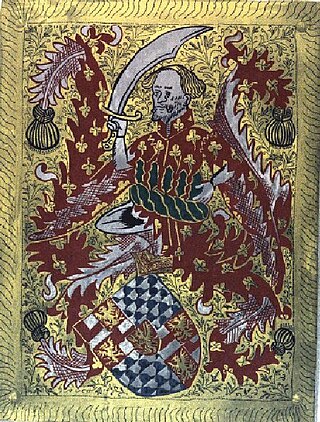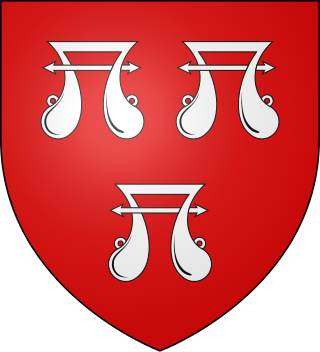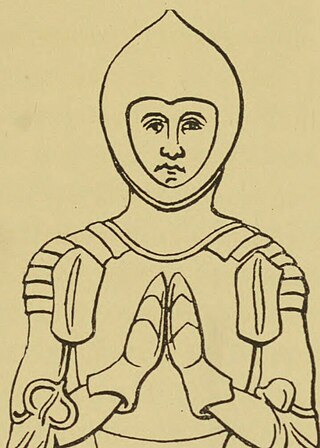Contents
| Other decades |
| 1410s | 1420s | 1430s | 1440s | 1450s |
Events from the 1430s in England .
| Other decades |
| 1410s | 1420s | 1430s | 1440s | 1450s |
Events from the 1430s in England .

Richard Woodville, 1st Earl Rivers, also Wydeville, was the father of Elizabeth Woodville and father-in-law of Edward IV.

The House of Stuart, originally spelled Stewart, was a royal house of Scotland, England, Ireland and later Great Britain. The family name comes from the office of High Steward of Scotland, which had been held by the family progenitor Walter fitz Alan. The name Stewart and variations had become established as a family name by the time of his grandson Walter Stewart. The first monarch of the Stewart line was Robert II, whose male-line descendants were kings and queens in Scotland from 1371, and of England, Ireland and Great Britain from 1603, until 1714. Mary, Queen of Scots, was brought up in France where she adopted the French spelling of the name Stuart.

Earl of Arundel is a title of nobility in England, and one of the oldest extant in the English peerage. It is currently held by the Duke of Norfolk, and it is used by his heir apparent as a courtesy title.

John Fitzalan, 7th Earl of Arundel, 4th Baron MaltraversKG was an English nobleman and military commander during the later phases of the Hundred Years' War. His father, John Fitzalan, 3rd Baron Maltravers, fought a long battle to lay claim to the Arundel earldom, a battle that was not finally resolved until after the father's death, when John Fitzalan the son was finally confirmed in the title in 1433.

John Sutton VI, 1st Baron Dudley, KG, was an English nobleman, diplomat, and councillor of King Henry VI. He fought in several battles during the Hundred Years' War and the Wars of the Roses, as well as acted as Lord Lieutenant of Ireland from 1428 to 1430.

Thomas Ros or Roos, 8th Baron Ros of Helmsley was an English peer.
Ambroise de Loré was baron of Ivry in Normandy, a French military commander, and comrade-in-arms of Joan of Arc. A reforming commisar of trades and police and "Garde de la prévôté de Paris", he became Provost of Paris from 1436 to 1446. He also fought at the battles of Agincourt, la Brossinière, Orleans and Patay.

Thomas Chaucer was an English courtier and politician. The son of the poet Geoffrey Chaucer and his wife Philippa Roet, Thomas was linked socially and by family to senior members of the English nobility, though he was himself a commoner. Elected fifteen times to the Parliament of England, he was Speaker of the House of Commons for five parliaments in the early 15th century.
Alice Montacute was an English noblewoman and the suo jure 5th Countess of Salisbury, 6th Baroness Monthermer, and 7th and 4th Baroness Montagu, having succeeded to the titles in 1428.

Robert Willoughby, 6th Baron Willoughby de Eresby was an English nobleman and military commander in the Hundred Years' War.

John Stourton, 1st Baron Stourton of Stourton, Wiltshire, was an English soldier and politician, elevated to the peerage in 1448.
The decade of the 1430s in art involved some significant events.
Louis of Luxembourg;. Bishop of Therouanne 1415–1436, Archbishop of Rouen, 1436, Bishop of Ely 1437, Cardinal.
Events from the 1420s in England.
Sir Thomas Browne was a Member of Parliament and Chancellor of the Exchequer. Browne's tenure as Chancellor occurred during the Great Bullion Famine and the Great Slump in England. He was executed for treason on 20 July 1460.
Joan de Beauchamp, Baroness Bergavenny was an English noblewoman, and the wife of William de Beauchamp, 1st Baron Bergavenny of the Welsh Marches.

Lady Eleanor Beauchamp, Baroness de Ros and Duchess of Somerset was the second daughter of Richard de Beauchamp, 13th Earl of Warwick and Elizabeth de Berkeley, daughter of Thomas de Berkeley, 5th Baron Berkeley.
The Fitzalan Chapel is the chancel of the church of St Nicholas in the western grounds of Arundel Castle, in West Sussex, England.

Edmund Beaufort, 2nd Duke of Somerset, 4th Earl of Somerset, 1st Earl of Dorset, 1st Marquess of Dorset styled 1st Count of Mortain, KG, was an English nobleman and an important figure during the Hundred Years' War. His rivalry with Richard, Duke of York, was a leading cause of the Wars of the Roses.